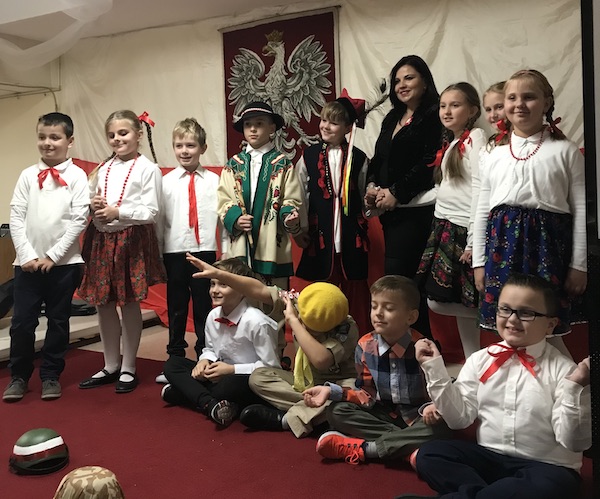
SUNSET PARK — When Auxiliary Bishop Witold Mroziewski served as pastor of Our Lady of Czestochowa Church in Sunset Park 10 years ago, he noticed that many of his parishioners did not reside in the neighborhood but instead came from elsewhere to attend Mass at the traditionally Polish parish.
“We had many parishioners traveling from other parts of Brooklyn to be present for the Polish language Masses and to participate in the parish’s activities as well,” recalled Bishop Mroziewski, a Polish American.
That still rings true today at Our Lady of Czestochowa, as well as at other traditionally Polish parishes in the Diocese of Brooklyn, which draw parishioners from far and wide.
The willingness to travel is a testament of the devotion to faith that many Polish Americans display in their daily lives and insist on handing down to their children. Poles as a community believe strongly in making sure their children are brought up in the faith, Bishop Mroziewski said.
“We do not give them a choice!” jokes Wioletta Bednarczuk, a parishioner of St. Stanislaus Church in Ozone Park.
It starts early, Bednarczuk explained. “We are bringing our children to church when they are little ones. Church becomes like home to them. There is no question of, ‘I don’t want to go to church or I don’t want to be involved in the holidays.’ Children learn to adapt because it is so much a part of life,” she said.
And religion isn’t just for church. Conversations about God and faith routinely take place around the dinner table, Bednarczuk said.
This would seem to be in contrast to other Catholics in the U.S., many of whom are not placing a priority on passing the faith down to their children. According to a Pew Research Center poll, released in January, only 35% of Catholic parents in the U.S. believe it’s extremely important that their children belong to the same religion.
Jadzia McEvoy, a parishioner of St. Stanislaus Kostka Church in Greenpoint, remembered attending Polish-language Masses as a child. “It was something you knew you had to do,” she said.
At the First Friday Masses (held for students on the first Friday of each month), the eighth graders would sing a song in Polish, she added.
McEvoy also recalled the fun she had taking part in Polish folk dancing groups as a child. “You felt like you were a part of something big, much bigger than yourself. There is pride in our national identity,” she explained.
There are approximately 99,000 Polish Americans in the Diocese of Brooklyn, according to Bishop Mroziewski.
The diocese has six Polish American parishes that were established by Polish immigrants in the late 19th or early 20th century and where customs and traditions from the old country are still very much alive, including the annual blessing of Easter food baskets by Bishop Robert Brennan.
Another 20 parishes are not predominantly Polish but have large enough Polish American populations that they celebrate at least one Mass in Polish on Sundays.
The traditions that are handed down include dressing up for church. “The Polish church is very conservative, I would say. There are no open shoulders with the skin showing or things like that. If you’re going to praise God, you should look a certain way,” Bednarczuk explained. “Back in Poland, I used to know people who would wash their cars before they drove to church. They had so much respect, they didn’t want to go to church in a dirty car.”
The strength of the Polish American community’s faith is due largely to immigrants who settled in the U.S. and made sure to bring their traditions with them, Bishop Mroziewski said.
“The extension of the faith comes from a generation mostly the people in the old country. They baptized their children and I would say took care of the religion. Now they are here and they bring the children up in the Church, just like they did in Poland. They think it is a family responsibility to raise them in the Catholic faith,” he explained.
Poland is a Catholic country. It is estimated that 92% of the population is Catholic.
“I think a lot of how we live is from the old country,” Bednarczuk said. “I think that is because the Church in Poland is really involved in politics and in every aspect of Polish people’s lives. When there is a Church holiday, it is a national holiday. No one goes to work. Everyone stays home.”
Their determination to pass on their Catholic faith could also be due to the fact that Poles had to overcome a great deal to be able to practice the faith in their native land.
Poles lived under Nazi rule from the 1939 German invasion until the end of World War II. But the country lived under communism for decades after that until 1991 when the Warsaw Pact was dissolved. The communists, in particular, frowned on the idea of freedom of religion.
Prior to communism, faith formation classes were taught in Polish public schools as well as Catholic schools. “After the Second World War, when the communists took over the country, the system was changed. Religious education was taken out of the school,” Bishop Mroziewski said.
After the fall of communism, religious education was brought back to the schools. Bishop Mroziewski, who was a young priest in 1991, was part of the first generation of clergy allowed to return to the classroom to teach faith formation classes.
Faith still runs deep in Polish culture and daily life. According to a 2020 Pew Research Center poll, 69% of people in Poland said God is an important part of their daily lives and another 56% said it’s important to pray every day.

Honest, sincere article that needs to be noted.